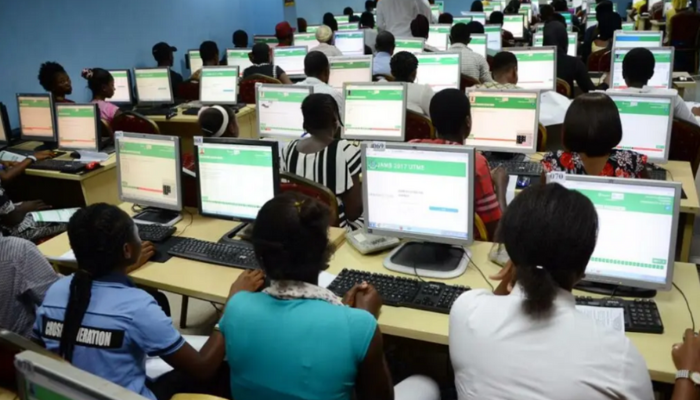Improve educational standard not varsity entry age
Following his monitoring of the recently held Unified Tertiary Matriculation Examination (UTME) in Abuja, the Minister of Education, Prof. Tahir Mamman, decried the rate of underage entry into universities, adding that plans were underway to review and peg the minimum entry age into tertiary institutions in the country at 18 years. “We noticed that the […]

UTME
Following his monitoring of the recently held Unified Tertiary Matriculation Examination (UTME) in Abuja, the Minister of Education, Prof. Tahir Mamman, decried the rate of underage entry into universities, adding that plans were underway to review and peg the minimum entry age into tertiary institutions in the country at 18 years. “We noticed that the age of those who have applied to go to the university, some of them are really too young. We are going to look at it because they are too young to understand what a university education is all about,” Mamman said.
The minister explained that university is the stage when students migrate from a controlled environment to one in which they are in charge of their own affairs. He argued that if they are too young, when entering into the university, they won’t be able to manage themselves properly. He contended that under-age students “account for some of the problems we are seeing in the universities.” The minister admitted that students of 15 and 16 years were seen writing the UTME. Advising parents, Mamman urged them to allow their children to attain some level of maturity before entering the university in order to better manage their affairs.
The Senate, on its part, assured Nigerians that the 16-year age requirement for applicants seeking admission to tertiary institutions in the country has not been changed. The Red Chamber insisted that the comments about increasing the age limit for university admission to 18 years were personal opinions. Speaking on the matter in an interview with journalists, the Chairman of the Senate Committee on Media and Public Affairs, Adeyemi Adaramodu, clarified that any downward or upward review of the age limit could only be done by a legislative instrument that followed due process.
On the other hand, members of the Senate Committee on Tertiary Institutions and Tertiary Education Trust Fund (TETFund) declared their support for the move by the federal government to peg the minimum entry age into tertiary institutions in the country at 18 years. Speaking on behalf of this committee while monitoring the 2024 UTME, its chairman, Senator Muntari Dandutse, said the Senate would support every effort by the government to streamline admission processes, especially the area of minimum age qualification for entry into tertiary institutions in the country.
However, defining the age limit for entry into tertiary institutions in Nigeria is relative and could be counter-productive, especially to a group of learners identified by educational psychologists as precocious children. They are children whose mental age is ahead of their chronological age. Gifted children with exceptional intelligence quotient also belong to this category of learners. It makes no sense to ask a 16-year-old student who has the mental capacity to proceed to the university with brilliant UTME and Senior Secondary School Certificate Examination (SSCE) results to wait for another two years in order to fulfill the age requirement for admission.
Besides, of what benefit is it, if we may ask, if a student graduates from secondary school at 18 years of age or more but fails to obtain minimum credit passes in the SSCE or the minimum cut-off point in the UTME? Poor quality of learners produced by the system has been one of the most critical banes of education in Nigeria. According to JAMB, the result of the recently conducted 2024 UTME shows that 1.4 million of the 1.8 million candidates who sat for the examination scored below 200 out of 400 marks. This abysmal failure rate simply depicts how the fallen standard of education continues to worsen.
Rather than expend the limited funds, spend precious time, and exhaust energy on the age limit for admission into tertiary institutions, such resources could be deployed to drafting a bill on other more important issues bedevilling the entire education sector in the country. It would serve Nigeria better if, for instance, the minister of education submits a bill on how to resuscitate the country’s decayed state of education.
The worst hit in the existing mess in the country’s education system is the set of schools in Nigeria’s rural communities. Even the private schools in urban towns and cities, which were once alternatives to dilapidated public schools, have since become centres of unprofessional practices and anti-social behaviours.
If Prof. Mamman, as the minister of education, has so much to do for children attending schools, including regulating their age, there’s so much he could also do for out-of-school children. At a recent regional stakeholders’ meeting on out-of-school children, organised for three states in Bauchi, the United Nations Children Education Fund (UNICEF) noted that Nigeria had the highest number of this category of children globally. Daily Trust calls on the minister of education to refocus his attention away from the trivial issue of age limit to understanding the challenges facing education in the country, with a view to launching and implementing a workable blueprint to rescue the system from total collapse.
